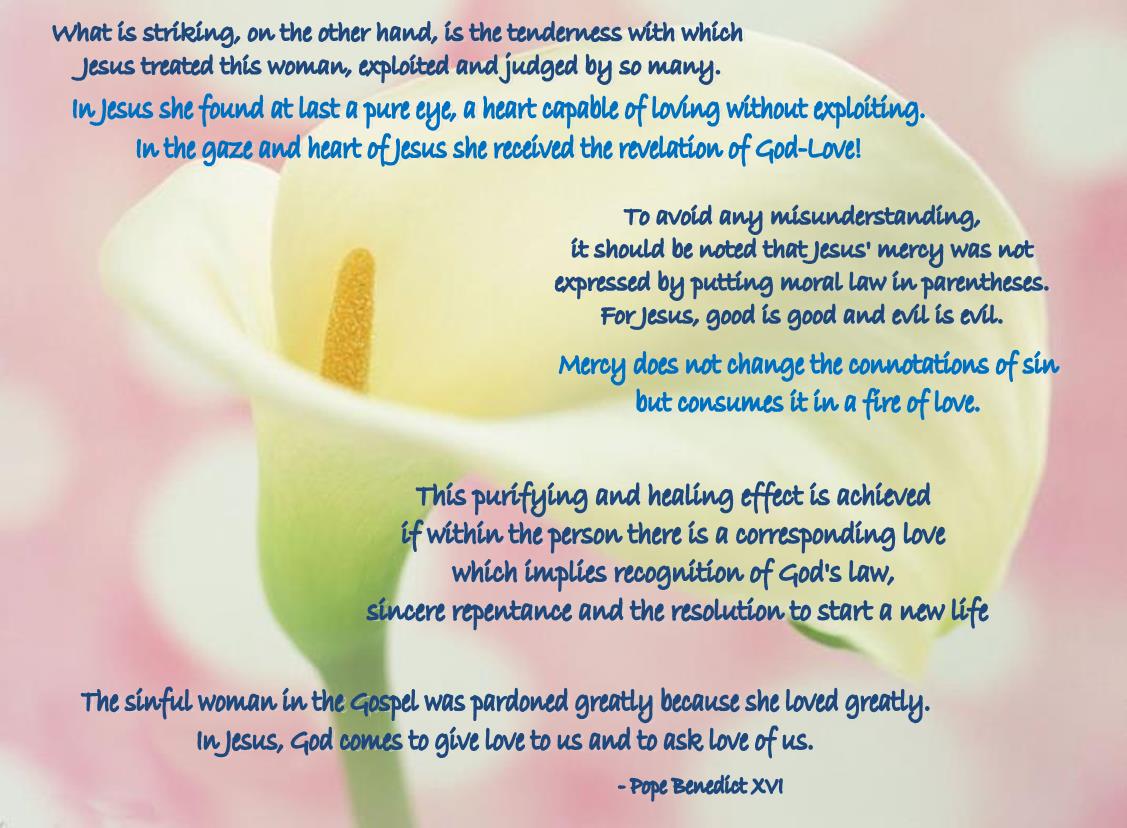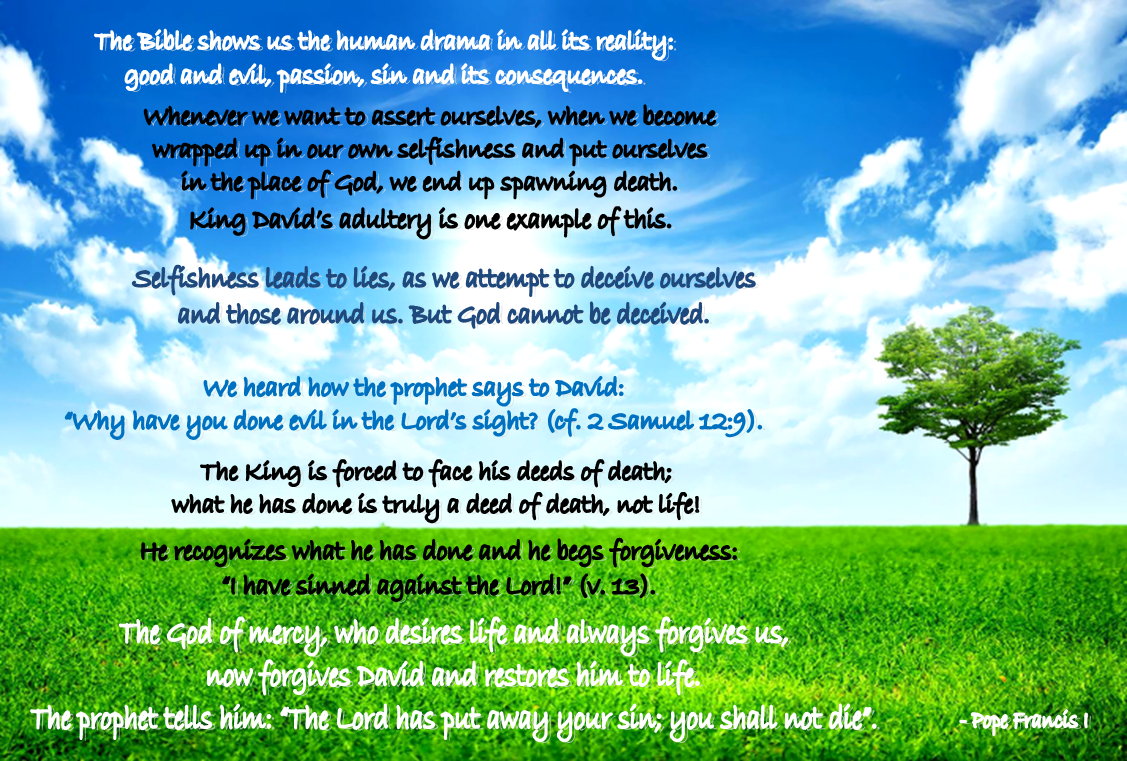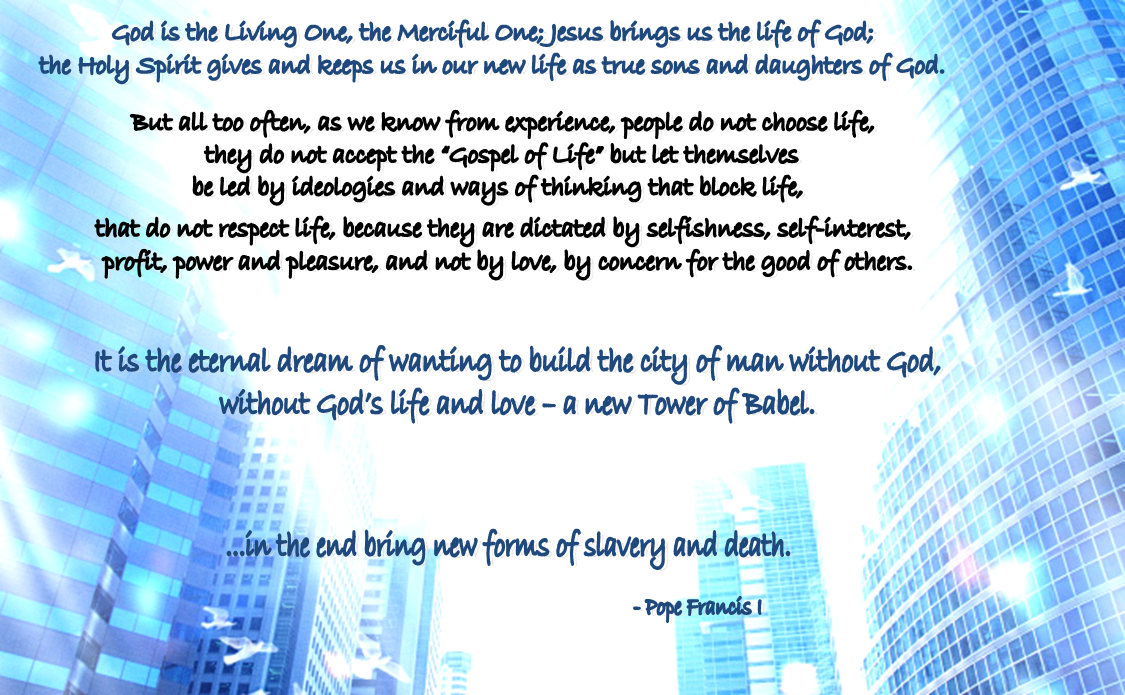|
16 |

|
And so we come to the evangelical heart of today's Word of God. Jesus himself, in the passage from Luke's Gospel which has just been read, explains to us the dynamism of authentic conversion, pointing out to us as a model the sinful woman redeemed by love. It should be recognized that this woman had ventured much.
The manner in which she chose to come before Jesus, bathing his feet with tears and drying them with her hair, kissing them and sprinkling scented oil upon them, was done to shock those who viewed people in her condition with the merciless eye of the judge.
What is striking, on the other hand, is the tenderness with which Jesus treated this woman, exploited and judged by so many. In Jesus she found at last a pure eye, a heart capable of loving without exploiting. In the gaze and heart of Jesus she received the revelation of God-Love!
To avoid any misunderstanding, it should be noted that Jesus' mercy was not expressed by putting moral law in parentheses. For Jesus, good is good and evil is evil. Mercy does not change the connotations of sin but consumes it in a fire of love.
This purifying and healing effect is achieved if within the person there is a corresponding love which implies recognition of God's law, sincere repentance and the resolution to start a new life.
The sinful woman in the Gospel was pardoned greatly because she loved greatly. In Jesus, God comes to give love to us and to ask love of us.
My dear brothers and sisters, what was the life of the converted Francis if not a great act of love? This is revealed by his passionate prayers, rich in contemplation and praise, his tender embrace of the Divine Child at Greccio, his contemplation of the Passion at La Verna, his living "according to the form of the Holy Gospel" (2 Test. 14), his choice of poverty and his quest for Christ in the faces of the poor. This was his conversion to Christ, to the point that he sought to be "transformed" into him, becoming his total image; and this explains his typical way of life by virtue of which he appears to us to be so modern, even in comparison with the great themes of our time such as the search for peace, the safeguard of nature, the promotion of dialogue among all people. In these things Francis was a true teacher. However, he was so by starting from Christ.
Indeed, Christ is "our peace" (cf. Ephesians 2: 14). Christ is the very principle of the cosmos, since through him all things were made (cf. John 1: 3). Christ is the divine truth, the eternal "Logos", in which, in time, every "dia-logos" finds its ultimate foundation. Francis profoundly embodies this "Christological" truth which is at the root of human existence, the cosmos and history.
I cannot forget in today's context the initiative of John Paul II, my Predecessor of holy memory, who in 1986 wanted to gather here at a Prayer Meeting for Peace representatives of the Christian denominations and of the different world religions.
It was a prophetic intuition and a moment of grace, as I said a few months ago in my Letter to the Bishop of this Town on the occasion of the 20th anniversary of that event. The choice of celebrating the meeting at Assisi was prompted precisely by the witness of Francis as a man of peace to whom so many people, even from other cultural and religious positions, look with sympathy.
At the same time, the light of the "Poverello" on that initiative was a guarantee of Christian authenticity, since his life and message are so visibly based on Christ's choice to reject a priori any temptation of religious indifferentism which would have nothing to do with authentic interreligious dialogue.
The "spirit of Assisi", which has continued to spread throughout the world since that event, counters the spirit of violence and the abuse of religion as a pretext for violence. Assisi tells us that faithfulness to one's own religious conviction, and especially faithfulness to the Crucified and Risen Christ, is not expressed in violence and intolerance but in sincere respect for the other, in dialogue, in a proclamation that appeals to freedom and reason and in the commitment to peace and reconciliation.
The failure to combine acceptance, dialogue and respect for all with the certainty of faith which every Christian, like the Saint of Assisi, is bound to foster, proclaiming Christ as the Way, the Truth and the Life of man (cf. John 14: 6), the one Saviour of the World, can be neither an evangelical nor a Franciscan attitude.
May Francis of Assisi obtain the grace of an authentic and full conversion to the love of Christ for this particular Church, for the Churches in Umbria, for the whole of the Church in Italy whose Patron he is, together with St Catherine of Siena, and for the many people in the world who refer to him.
Acknowledgment: We thank the Vatican Publisher for allowing us to publish the Homily of Pope Benedict XVI, so that it could be accessed by more people all over the world; as a source of God’s encouragements to all of us.
HOLY MASS FOR "EVANGELIUM VITAE" DAY HOMILY OF POPE FRANCIS Saint Peter's Square
Dear Brothers and Sisters,
This celebration has a very beautiful name: the Gospel of Life. In this Eucharist, in the Year of Faith, let us thank the Lord for the gift of life in all its forms, and at the same time let us proclaim the Gospel of Life.
On the basis of the word of God which we have heard, I would like to offer you three simple points of meditation for our faith: first, the Bible reveals to us the Living God, the God who is life and the source of life; second, Jesus Christ bestows life and the Holy Spirit maintains us in life; and third, following God’s way leads to life, whereas following idols leads to death. |

|
1. The first reading, taken from the Second Book of Samuel, speaks to us of life and death. King David wants to hide the act of adultery which he committed with the wife of Uriah the Hittite, a soldier in his army. To do so, he gives the order that Uriah be placed on the front lines and so be killed in battle. The Bible shows us the human drama in all its reality: good and evil, passion, sin and its consequences. Whenever we want to assert ourselves, when we become wrapped up in our own selfishness and put ourselves in the place of God, we end up spawning death. King David’s adultery is one example of this. Selfishness leads to lies, as we attempt to deceive ourselves and those around us. But God cannot be deceived. We heard how the prophet says to David: “Why have you done evil in the Lord’s sight? (cf. 2 Samuel 12:9). The King is forced to face his deeds of death; what he has done is truly a deed of death, not life! He recognizes what he has done and he begs forgiveness: “I have sinned against the Lord!” (v. 13). The God of mercy, who desires life and always forgives us, now forgives David and restores him to life. The prophet tells him: “The Lord has put away your sin; you shall not die”.
What is the image we have of God? Perhaps he appears to us as a severe judge, as someone who curtails our freedom and the way we live our lives. But the Scriptures everywhere tell us that God is the Living One, the one who bestows life and points the way to fullness of life. I think of the beginning of the Book of Genesis: God fashions man out of the dust of the earth; he breathes in his nostrils the breath of life, and man becomes a living being (cf. 2:7). God is the source of life; thanks to his breath, man has life. God’s breath sustains the entire journey of our life on earth. I also think of the calling of Moses, where the Lord says that he is the God of Abraham, the God of Isaac and the God of Jacob, the God of the living. When he sends Moses to Pharaoh to set his people free, he reveals his name: “I am who I am”, the God who enters into our history, sets us free from slavery and death, and brings life to his people because he is the Living One. I also think of the gift of the Ten Commandments: a path God points out to us towards a life which is truly free and fulfilling. The commandments are not a litany of prohibitions – you must not do this, you must not do that, you must not do the other; on the contrary, they are a great “Yes!”: a yes to God, to Love, to life. Dear friends, our lives are fulfilled in God alone, because only he is the Living One! |

|
2. Today’s Gospel brings us another step forward. Jesus allows a woman who was a sinner to approach him during a meal in the house of a Pharisee, scandalizing those present. Not only does he let the woman approach but he even forgives her sins, saying: “Her sins, which are many, are forgiven, for she loved much; but he who is forgiven little, loves little” (Luke 7:47). Jesus is the incarnation of the Living God, the one who brings life amid so many deeds of death, amid sin, selfishness and self-absorption. Jesus accepts, loves, uplifts, encourages, forgives, restores the ability to walk, gives back life. Throughout the Gospels we see how Jesus by his words and actions brings the transforming life of God. This was the experience of the woman who anointed the feet of the Lord with ointment: she felt understood, loved, and she responded by a gesture of love: she let herself be touched by God’s mercy, she obtained forgiveness and she started a new life. God, the Living One, is merciful. Do you agree? Let’s say it together: God, the Living One, is merciful! All together now: God, the Living One, is merciful. Once again: God, the Living One is merciful!
This was also the experience of the Apostle Paul, as we heard in the second reading: “The life I now live in the flesh I live by faith in the Son of God who loved me and gave himself for me” (Galatians 2:20). What is this life? It is God’s own life. And who brings us this life? It is the Holy Spirit, the gift of the risen Christ. The Spirit leads us into the divine life as true children of God, as sons and daughters in the only-begotten Son, Jesus Christ. Are we open to the Holy Spirit? Do we let ourselves be guided by him? Christians are “spiritual”. This does not mean that we are people who live “in the clouds”, far removed from real life, as if it were some kind of mirage. No! The Christian is someone who thinks and acts in everyday life according to God’s will, someone who allows his or her life to be guided and nourished by the Holy Spirit, to be a full life, a life worthy of true sons and daughters. And this entails realism and fruitfulness. Those who let themselves be led by the Holy Spirit are realists, they know how to survey and assess reality. They are also fruitful; their lives bring new life to birth all around them.
3. God is the Living One, the Merciful One; Jesus brings us the life of God; the Holy Spirit gives and keeps us in our new life as true sons and daughters of God. But all too often, as we know from experience, people do not choose life, they do not accept the “Gospel of Life” but let themselves be led by ideologies and ways of thinking that block life, that do not respect life, because they are dictated by selfishness, self-interest, profit, power and pleasure, and not by love, by concern for the good of others. It is the eternal dream of wanting to build the city of man without God, without God’s life and love – a new Tower of Babel. It is the idea that rejecting God, the message of Christ, the Gospel of Life, will somehow lead to freedom, to complete human fulfillment. As a result, the Living God is replaced by fleeting human idols which offer the intoxication of a flash of freedom, but in the end bring new forms of slavery and death. The wisdom of the Psalmist says: “The precepts of the Lord are right, rejoicing the heart; the commandment of the Lord is pure, enlightening the eyes” (Psalm 19:8). Let us always remember: the Lord is the Living One, he is merciful. The Lord is the Living One, he is merciful.
Dear brothers and sisters, let us look to God as the God of Life, let us look to his law, to the Gospel message, as the way to freedom and life. The Living God sets us free! Let us say “Yes” to love and not selfishness. Let us say “Yes” to life and not death. Let us say “Yes” to freedom and not enslavement to the many idols of our time. In a word, let us say “Yes” to the God who is love, life and freedom, and who never disappoints (cf. 1 John 4:8; John 11:2; John 8:32); let us say “Yes” to the God who is the Living One and the Merciful One. Only faith in the Living God saves us: in the God who in Jesus Christ has given us his own life by the gift of the Holy Spirit and has made it possible to live as true sons and daughters of God through his mercy. This faith brings us freedom and happiness. Let us ask Mary, Mother of Life, to help us receive and bear constant witness to the “Gospel of Life”. Amen.
Acknowledgment: We thank the Vatican Publisher for allowing us to publish the Homily of Pope Francis I, so that it could be accessed by more people all over the world; as a source of God’s encouragements to all of us. 20 June 2013
|